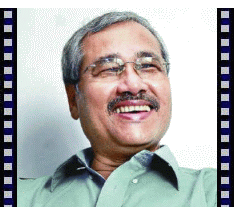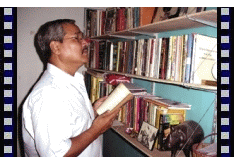He is considered as the face of Assamese cinema in India as well as abroad.
His career is studded with jewels like Halodhia Choraye Baodhan Khai, Firingoti, Hkhagoroloi Bohu Door, Pokhi, Konikar Ramdhenu etc. Actors fall over each other to be a part of his films. He is swamped with awards galore. Of late, another plume has been added to his beret. He was honoured with the Padmashri. He is renowned filmmaker Jahnu Barua, a man for whom cinema is just not froth and fluff but serious business.
At a time when the Assamese film industry is churning out candyfloss romances, mushy love stories, family weepies and jaded action flicks which are inferior clones of Bollywood, he has refused to toe their line for a few pieces of gold and continues to make cinema on subjects which appeal to him thereby carving an identity of his own.
Jahnu Barua is foraging the net for some information when we catch up with him in his office, Dolphin Communications. His shirt looks crumpled and his salt and pepper hair is a bit ruffled but he seems to be blase about it. A man of his stature cannot be bothered with such trifle things. The walls of his spartan office is choc-o-block with framed photographs of the film-maker receiving awards from various Presidents of India. Each photograph speaks a thousand words about the man and his achievement. The book shelves are crowded with a maddening mix of books from fiction to computers, a pointer towards the owner’s varied taste.
 "To me cinema is one of the most powerful medium because its attraction is tremendous and it reaches out to a vast audience. People believe what they see in films and so it is also a dangerous medium. Films can construct as well as destroy a society. And hence filmmakers have big responsibilities and they cannot be callous. Making films is not fun."
"To me cinema is one of the most powerful medium because its attraction is tremendous and it reaches out to a vast audience. People believe what they see in films and so it is also a dangerous medium. Films can construct as well as destroy a society. And hence filmmakers have big responsibilities and they cannot be callous. Making films is not fun."
These days he has his hands full with the post-production work of Tora, a children film, commissoned to him by the Children Flims and Drama Division. "Tora is a about a little girl who is more humane than her elders," he informs.
Be it Halodhia Choraye Baodhan Khai, which deals with the exploitation of a farmer at the hands of a mahajan, Firingoti, a story about a teacher who faces many odds to spread the light of education in a village, or Hkhagoroloi Bohu Door which revolves around a boatman whose only means of survival is under threat — his films are all very close to reality and Jahnu Barua has never tried to sugar coat them. "I know cinema means entertainment. But why should entertainment be mindless? I want my films to make the audience think."
Potraying travails of human life through powerful imagery and lucid narration is his forte. His films have dealt with social issues but he has always been successful in retaining its aesthetic appeal. "Through my films I don’t want to pass any judgment. I try my best not to criticize. I just want to tell the audience about issues which stirs my imagination and thoughts," he states.
So how does he zero in on the subject? "I cannot make films on subjects which I cannot relate to. There are subjects which haunt me and I am not at peace until I translate it into a large canvas. My observation, experience and knowledge which I have culled in life shape my films," he informs.
His oeuvre also includes a bevy of children films. With Konikar Ramdhenu he completes the Koka trilogy, the first two being Hkhagoroloi Bohu Boor and Pokhi. That Jahnu Barua dissects the child’s mind with the precision of a skilful surgeon is evident in these films. "Making children films is quite a challenge as you can only hit the bull’s eye if you see the world through their eyes," he says.
If Pokhi shows how a little girl wins the heart of her crooked grandfather and also reforms him with doses of love and her innocence, Konikar Ramdhenu takes us to the fairy tale world of children. "I wanted to make a human statement in cinematic text on an imaginative and intelligent boy who has his life going horribly wrong, and is too powerless to do anything about it. Like hundreds of children from rural India who run away from home and end up in cities, he finds abuse and exploitation. The question I wanted to explore is whether his desire to live in a beautiful world, a concept that he has evolved in his imagination, can be fulfilled in the society in which he lives."
Stretching the conversation on similar lines he says , "A child likes to put his wings of imagination and fly high. At times he may tell a lie or two. For example, he may say that he has seen hundreds of colourful butterflies near a pond which may be untrue. In such a situation if parents reprimand him, his imagination will die a slow death. A child should be allowed to dream as it is said to be the fodder for creativity."
Most of his child artistes were a bundle of jagged edges polished to perfection by the master himself. While the Pokhi girl was Jahnu Barua’s niece whom he selected after screening as many as 20 child artistes, Ronik was just another faceless boy before Konikar Ramdhenu. "My strategy of dealing with each child is different. You cannot treat all the children the same way," he says.
However, the man whose each and every frame is an audience’s delight is riled up with the quality of films produced by the Assamese film industry. "Quantity has increased but quality has hit an all time low. The present day films are like drugs, the effect vanishes soon." But he holds the audience culpable for the recent trend. "The audience should appreciate meaningful cinema and reject the trash. Only then there is a chance of improvement in quality," he says. So dejected is he that he often thinks of throwing the director’s cap away. "It is true that my films have won many accolades outside. But tell me how many people have seen my films here. After each award, I am honoured here and I always have a full audience. I wish it happened with my films too. I want appreciation for my films not me." An unsupportive system also makes things worse. "The government has a subsidy scheme for films. While some films which no Assamese would like to identify with get a whopping amount, we get a piffling sum which is very discouraging."
Born in Bokota, Sivasagar to Debeswar Barua and Gunabati Barua, Jahnu Barua’s family was a large one. They were seven brothers and three sisters. "We are descendants of Ahom king Sukapha and our family has a history of writing buranjis. It was my father who introduced me to the fascinating world of books. I remember that once my father had gifted me a book Ajon Buhra Manuh Aru Sagor, the Assamese translation of Hemingway’s The Old Man and the Sea. I was deeply moved by this book."
 He did his B. Sc. from B. Barooah College, Guwahati. "I was never a good student," he says. He cut his celluloid teeth in an interesting manner. A film festival organized by the Guwahati Cine Club brought him face to face with the likes of Satyajit Ray. "It was for the first time I saw Satyajit Ray’s Pather Panchali and a Romanian film A Bomb was Stolen. These films left an indelible impression in my mind." And Jahnu Barua found his calling. His next stop was Pune where he did a diploma in film direction from Film and Television Institute of India. Thereafter he joined the Indian Space Research Organization as a Sattelite Television Producer and made as many as 20 rural based programmes. He also directed a few short films. In Mumbai he also got an offer to direct a Hindi film but Jahnu Barua knew that he wanted to make an Assamese film. His first film was Aparoopa. Set against the backdrop of a tea garden, it is a story about a woman who is entangled in a web of loneliness, courtesy her
husband who always lives life out of suitcase. Depressed, she gets drawn to her ex-lover from whom she seeks fulfilment. This film was also made into Hindi titled Apeksha. "My film raked up a controversy as people thought I was openly showing infidelity which was a taboo subject in those days. They didn’t understand that my main theme was loneliness. I wanted to explore the reasons which led to her audacity"
He did his B. Sc. from B. Barooah College, Guwahati. "I was never a good student," he says. He cut his celluloid teeth in an interesting manner. A film festival organized by the Guwahati Cine Club brought him face to face with the likes of Satyajit Ray. "It was for the first time I saw Satyajit Ray’s Pather Panchali and a Romanian film A Bomb was Stolen. These films left an indelible impression in my mind." And Jahnu Barua found his calling. His next stop was Pune where he did a diploma in film direction from Film and Television Institute of India. Thereafter he joined the Indian Space Research Organization as a Sattelite Television Producer and made as many as 20 rural based programmes. He also directed a few short films. In Mumbai he also got an offer to direct a Hindi film but Jahnu Barua knew that he wanted to make an Assamese film. His first film was Aparoopa. Set against the backdrop of a tea garden, it is a story about a woman who is entangled in a web of loneliness, courtesy her
husband who always lives life out of suitcase. Depressed, she gets drawn to her ex-lover from whom she seeks fulfilment. This film was also made into Hindi titled Apeksha. "My film raked up a controversy as people thought I was openly showing infidelity which was a taboo subject in those days. They didn’t understand that my main theme was loneliness. I wanted to explore the reasons which led to her audacity"
Aparoopa was followed by Papori, Halodhia Choraye Baodhan Khai, Banani, Firingoti, Hkhagoroloi Bohu Door, Kuhkhal, Pokhi and Konikar Ramdhenu.
Winner of nine National awards, Jahnu Barua got his first major national and international recognition through his third film Holodhia Choraye Baodhan Khai that won the National award for the best film (golden lotus) in 1998 and several international awards and recognition including the Grand Prix Leopard and World Ecumenical Award at Locarno International Film Festival, and Best of Asia at the Tokyo International Film Festival.
His Hkhagoroloi Bohu Door won him the National Award for the best director in 1995, and 15 international awards including World Peace Prize at Chicago International Film Festival, and Best Director at the International Film Festival of Independent Film makers at Brussels, apart from being invited to as many as 42 prestigious film festivals world wide in a span of two years.
So how does it feel to participate in an international film festival? "It feels great to represent the country. But at the same time I feel sad too. Our country produces more than 800 films every year yet only a few are quality stuff. However, a small country like Iran makes only a few films yet manages to hog the limelight in the international arena."
Married to Gayatri, who is a filmmaker and also his inspiration, the couple has a six-year-old son named Oju. Jahnu Barua who shuttles between Mumbai and Guwahati loves to spend time with his son. "I am planning to shift him to Mumbai so that I can devote more time for him."
